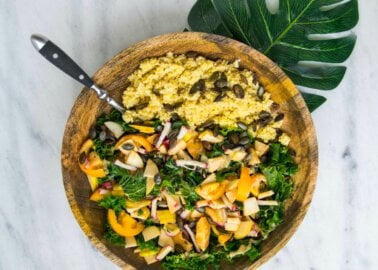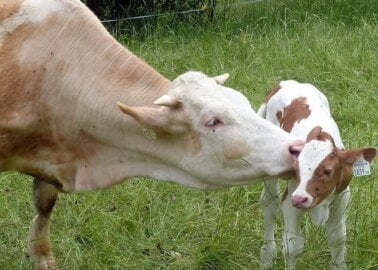Can’t Label Plants ‘Milk’? Then Let’s Be Honest About ‘Bovine Mammary Secretions’
The Department of Environment, Food and Rural is considering the introduction of legislation that would limit the definition of “milk” to exclude plant-based milks – such as oat, soya, and almond.
PETA has subsequently rushed off a letter to the farming minister, Mark Spencer, challenging the organisation to stand up for honesty in advertising. The letter calls for cows’ milk to be labelled as what it really is: bovine mammary secretions.
If DEFRA backs this absurd legislation, it would be wise to rethink the definition of cows’ milk. In accordance with its focus on consumer protection, the label “bovine mammary secretions” would help the public understand that they’re ingesting pus-filled mother’s milk from a cow.
Plant-Based Milk Isn’t Misleading, but the Dairy Industry Is
Consumers aren’t the least bit confused about vegan milks, but they’ve been misled by the dairy industry about the impact of cows’ milk production on animals, the environment, and human health.
Cows’ milk is suited to the nutritional needs of calves – who have four stomachs and will grow to weigh hundreds of kilograms – not humans, many of whom are lactose-intolerant. Cows aren’t the only animals who make milk for their babies, and their mammary secretions aren’t meant for humans any more than cats’ milk, rats’ milk, or bats’ milk are.
Cows’ Milk: What the Industry Isn’t Advertising
Using what industry insiders have called a “rape rack”, farmworkers sexually assault cows, impregnating them via artificial insemination in order to force them to produce mammary secretions for their calves.
The mothers, who bond with their babies just as human mothers do, are heartbroken when their calves are taken from them – often within hours or a day of birth, causing them both extreme distress. Anyone who lives near a dairy farm will tell you that mother cows can be heard frantically lowing for their calves for many days after this trauma occurs.
Out of every 100 cows, between 40 and 60 used for bovine mammary secretions suffer from mastitis – a painful inflammation of the udder – which makes them produce pus that contaminates their milk. It’s such an unavoidable part of the dairy industry that government regulations even specify the amount of pus from infected cows allowed in every jug of bovine mammary secretions.
Dictionary Definition of Plant-Based Milk
The proposed legislation is simply a desperate attempt to undermine the sale of plant-based milks by dairy corporations, which becomes even more apparent when you look up the definitions of “milk” in the Oxford Dictionary:
A white liquid produced by or made from plants.
– Oxford Dictionary
You can change a label, but you can’t change the fact that plant-based milks are far better for animals, the environment, and our health.
Coconut milk has been widely available in tins for decades, and limiting the definition of “milk” seems even more ludicrous when you consider the length of time that humans have been enjoying almond and soya milk. One of the earliest mentions of soya milk appears on a Chinese stone slab dated between the first and third centuries, while almond milk was used in Europe as far back as the eighth century.
Choose Oat, Soya, Rice, or Other Vegan Milks
There are so many wonderful brands on supermarket shelves, such as barista-style oat milk and protein-packed soya. It can be hard to choose the perfect plant-based milk, but PETA has put together guides to give you advice on choosing the right one for your tea, coffee, cereal, and more:
Always opt for plant-based milk – no matter what label is used – and pledge not to drink cows’ milk for 30 days:




